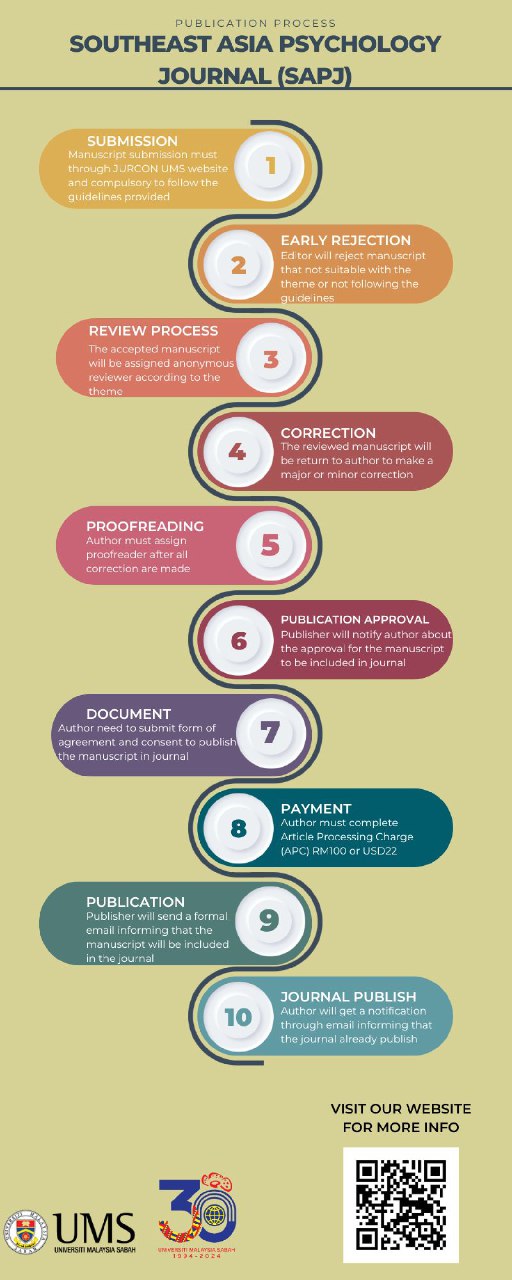The effect of emotional intelligence and job stress on mental health problems: a study among nurses
DOI:
https://doi.org/10.51200/sapj.v1i1.5728Keywords:
emotional intelligence, job stress, mental health problem, nurses.Abstract
The study attempted to examine the effect of emotional intelligence as a moderator of the job stress and mental health problem relationship. Data were collected from 677 nurses (361 trainees and 316 trained nurses) from three general hospitals in Malaysia. The Job Stress Survey (JSS) was adapted to assess generic sources of occupational stress. The Emotional Competence Inventory (ECI) was adapted to assess level of emotional competence and a scale of Occupational Stress Indicator (OSI) was adopted to investigate mental health problems among nurses. The purpose of the study was to examine the effect of sources of stress and emotional competency on mental health problem. We also evaluated whether nurses who were skilful at regulating their own and others’ emotions would be able to protect themselves from the adverse effects of stress and reporting less mental health problem than those low in emotional intelligence.
References
Austin, E.J. (2004). An investigation of the relationship between trait emotional intelligence and emotional task performance. Personality and Individual Differences, 36(8), 1855-1864.
Baglioni, Jr, A. J., Cooper, C. L. & Hingley, P. (1990). Job stress, mental health and job satisfaction among UK senior nurses. Stress Medicine, 6, 9 – 20.
Bar-On, R., Brown, J.M., Kirkcaldy, B.D., & Thomé, E.P. (2000). Emotional expression and implications for occupational stress; an application of the Emotional Quotient Inventory (EQ-I). Personality and Individual Differences, 28, 1107-1118.
Boyatzis, R., Goleman, D., & Hay/McBer. (1999). Emotional Competence Inventory (ECI) Technical manual. New York: Hay Group.
Brislin, R. W. 1973. Cross-cultural research methods. New York: John Wiley.
Johnson & Johnson: The emotional intelligence and leadership study. Consortium for research on emotional intelligence in organizations. Retrieved 20 June 2003 from http://www.eiconsortium?.org
Ciarrochi, J.V., Caputi, P., & Mayer, J.D. (2003). The distinctiveness and utility of a measure of trait emotional awareness. Personality and Individual Differences, 34,1477-1490.
Ciarrochi, J.V., Chan, A.Y.C., & Bajgar, J. (2001). Measuring emotional intelligence in adolescents. Personality and Individual Differences, 31,1105-1119.
Ciarrochi, J.V., Chan, A.Y.C., & Caputi, P. (2000). A critical evaluation of the emotional intelligence construct. Personality and Individual Differences, 28, 539-561.
Ciarrochi, J.V., Deane, F.P., & Anderson, S. (2002). Emotional intelligence moderates the relationship between stress and mental health. Personality and Individual Differences, 32, 197-209.
Cobb, S. & Rose, R.H. (1977). Hypertension, peptic ulcer and diabetes in air traffic controllers. Journal of Australia Medicine Association, 224, 489-492.
Cooper, C. L., Sloan, S. J. & William, S. (1988) Occupational Stress Indicator Management Guide. Oxford: NFER Nelson Publishing Company Limited.
Cooper, C. L. & Marshall, J. (1976) Occupational sources of stress: A review of the literature relating to coronary heart disease and mental ill-health. Journal of Occupational Psychology, 49, 11-28.
Cooper, C. L., Smith, M. J. (1986) Job stress and blue collar work. Chichester: John Wiley & Sons.
French, J. R. P. & Caplan, R. D. (1970) Psychosocial factor in coronary heart disease. Industrial Medicine, 39, 383-397.
Goleman, D. (1996). Emotional intelligence. New York: Bantam Books.
Goleman, D. (1998). Working with emotional intelligence. New York: Bantam Books.
Kornhauser, A. (1965) Mental health of the industrial worker. New York: Wiley.
Lazarus, R. S. & Folkman, S. (1984). Stress, appraisal, and coping. New York: Springer.








